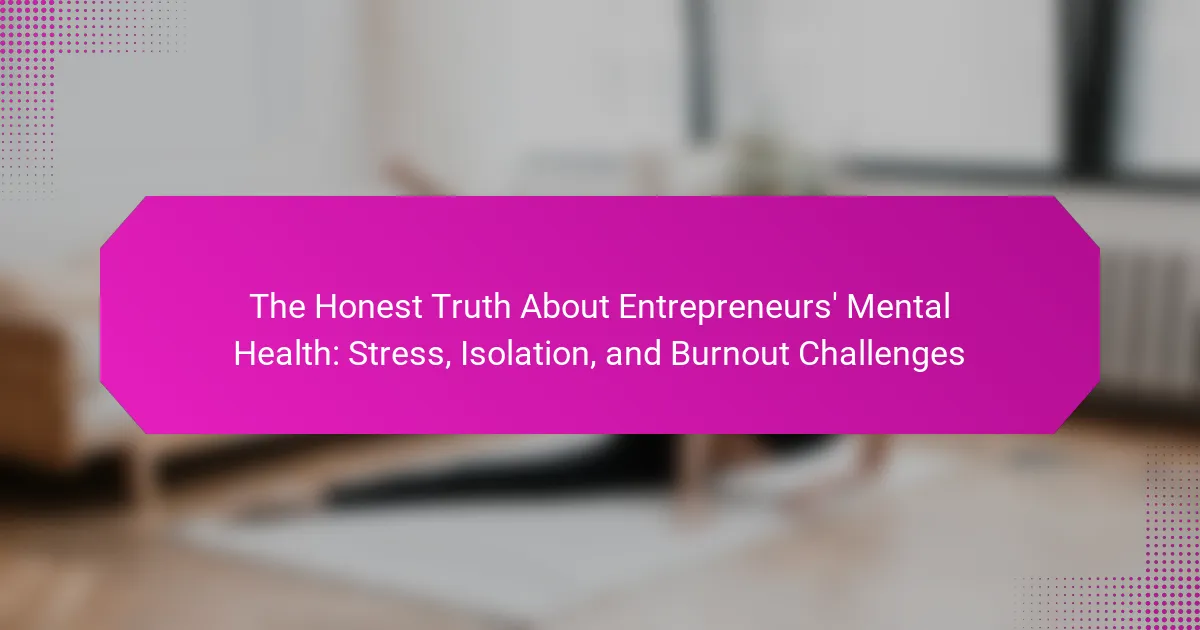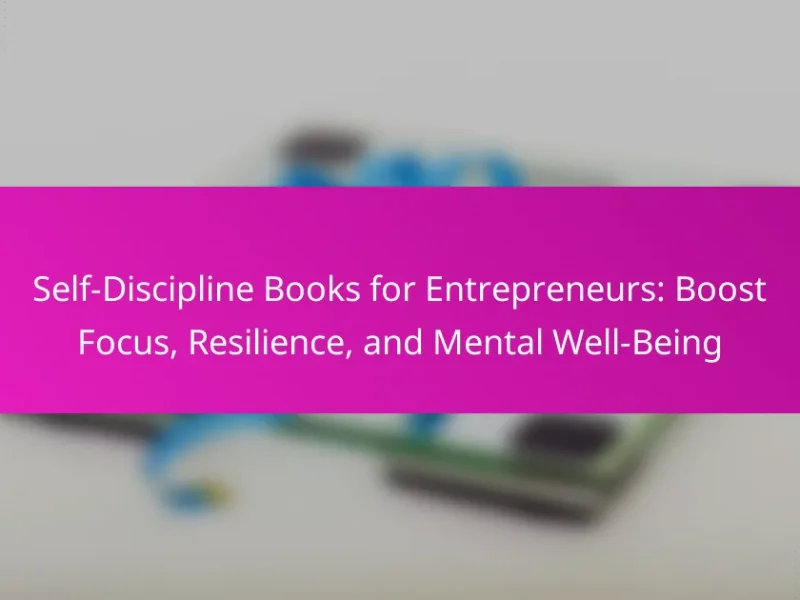Entrepreneurs often grapple with significant mental health challenges, including stress, isolation, and burnout. These issues arise from high demands, long hours, and the emotional toll of managing a business. Research shows that around 72% of entrepreneurs experience mental health issues, such as anxiety and depression. Effective strategies like self-care, setting boundaries, and seeking support are essential for mitigating these challenges and promoting well-being.
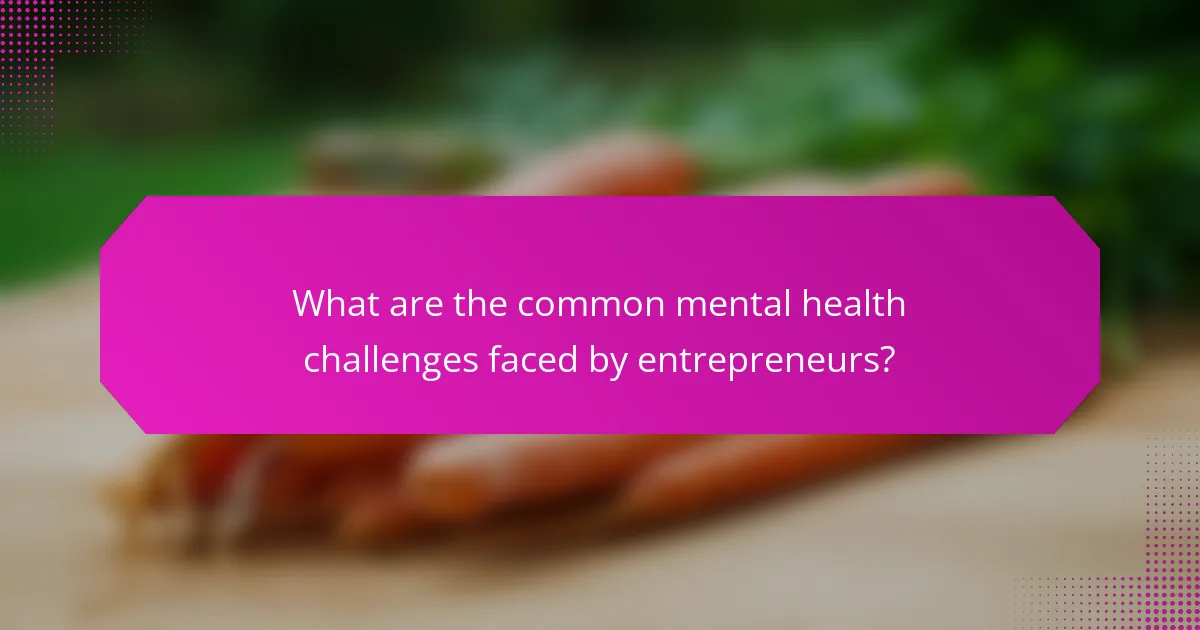
What are the common mental health challenges faced by entrepreneurs?
Entrepreneurs often face significant mental health challenges, including stress, isolation, and burnout. Stress arises from high demands and uncertainty, while isolation can result from the solitary nature of entrepreneurship. Burnout occurs due to prolonged stress without adequate recovery, leading to decreased productivity and motivation. Addressing these issues is crucial for sustainable success.
How does stress manifest in the entrepreneurial journey?
Stress in the entrepreneurial journey often manifests as anxiety, fatigue, and emotional exhaustion. Entrepreneurs face unique pressures, leading to heightened stress levels. Factors like financial uncertainty, long working hours, and isolation contribute significantly to their mental health challenges. Research indicates that nearly 70% of entrepreneurs experience mental health issues, with burnout being a common outcome. This unique attribute of the entrepreneurial experience highlights the critical need for support systems and coping strategies to manage stress effectively.
What role does isolation play in an entrepreneur’s mental health?
Isolation significantly impacts an entrepreneur’s mental health, often leading to increased stress and burnout. Entrepreneurs frequently work in solitude, which can exacerbate feelings of loneliness and hinder emotional support. A study indicated that 64% of entrepreneurs experience isolation, affecting their decision-making and overall well-being. Addressing this challenge through networking and support systems can mitigate negative effects and enhance mental resilience.
How can burnout impact business performance?
Burnout severely undermines business performance by reducing productivity and increasing turnover. It leads to diminished employee engagement, which can result in a lack of innovation and creativity. As a result, businesses may experience decreased profitability and a negative impact on company culture. Research indicates that burnout costs organizations an estimated $300 billion annually due to lost productivity and healthcare expenses. Addressing mental health proactively can enhance overall business resilience and performance.

What universal factors contribute to mental health issues among entrepreneurs?
Stress, isolation, and burnout significantly contribute to mental health issues among entrepreneurs. These factors stem from high-pressure environments, long working hours, and the emotional toll of managing a business.
Entrepreneurs often face unique challenges, such as the fear of failure and financial instability. Research indicates that approximately 30% of entrepreneurs experience anxiety and depression, highlighting the prevalence of mental health struggles in this demographic.
Support networks are crucial for mitigating these issues. Engaging with mentors or peers can alleviate feelings of isolation and provide emotional support. Additionally, implementing self-care practices can help manage stress and prevent burnout.
Ultimately, addressing these universal factors is essential for promoting healthier entrepreneurial environments and improving mental well-being.
How does the pressure of financial responsibility affect mental health?
Financial responsibility significantly impacts mental health by increasing stress, fostering isolation, and contributing to burnout among entrepreneurs. The pressure to maintain financial stability can lead to anxiety and feelings of inadequacy. Many entrepreneurs report experiencing high levels of stress due to the demands of managing finances, which can exacerbate mental health issues. As a result, maintaining a supportive network and practicing self-care are crucial for mitigating these effects.
What is the impact of work-life balance on mental well-being?
Work-life balance significantly enhances mental well-being by reducing stress and preventing burnout. Entrepreneurs often face unique challenges like isolation, which can exacerbate mental health issues. Establishing boundaries between work and personal life fosters a supportive environment, leading to improved emotional resilience. Studies show that individuals with better work-life balance report higher satisfaction and lower anxiety levels. Prioritizing mental health through balanced routines can directly impact productivity and overall happiness.
How does the fear of failure influence mental health?
Fear of failure significantly impacts mental health by increasing stress and anxiety among entrepreneurs. This fear can lead to isolation, as individuals may avoid seeking help or sharing their struggles. The pressure to succeed often results in burnout, diminishing overall well-being. Research shows that 72% of entrepreneurs experience mental health challenges, with fear of failure being a common trigger. Addressing this fear through supportive networks and coping strategies is essential for maintaining mental health in entrepreneurial environments.

What unique mental health challenges do entrepreneurs face compared to other professionals?
Entrepreneurs face unique mental health challenges, including elevated stress, isolation, and burnout, more than other professionals. These challenges stem from the pressures of decision-making, financial uncertainty, and the need for constant innovation. Research indicates that around 72% of entrepreneurs experience mental health issues, with anxiety and depression being prevalent. The isolation entrepreneurs often feel can exacerbate these issues, leading to a lack of support and increased feelings of loneliness. Burnout is particularly common, as entrepreneurs frequently work long hours and may struggle to maintain work-life balance.
How does the entrepreneurial mindset contribute to mental health struggles?
The entrepreneurial mindset can exacerbate mental health struggles due to high stress, isolation, and burnout. Entrepreneurs often face immense pressure to succeed, leading to chronic stress. This stress can manifest as anxiety or depression, impacting overall mental well-being. Isolation is another challenge, as entrepreneurs may feel disconnected from peers, reducing emotional support. Additionally, the relentless pursuit of goals can lead to burnout, characterized by exhaustion and disengagement. Addressing these issues is crucial for maintaining mental health in the entrepreneurial journey.
What are the implications of self-criticism in entrepreneurship?
Self-criticism can significantly hinder entrepreneurs, leading to increased stress and potential burnout. It often results in feelings of isolation, as entrepreneurs may withdraw from support networks. This mindset can diminish creativity and decision-making abilities, ultimately affecting business performance. Recognizing and addressing self-criticism is crucial for maintaining mental health and fostering a supportive entrepreneurial environment.

What rare but significant mental health challenges affect entrepreneurs?
Entrepreneurs face rare but significant mental health challenges like impostor syndrome, decision fatigue, and chronic anxiety. These issues stem from high expectations, constant pressure, and isolation. Impostor syndrome leads to self-doubt despite achievements, while decision fatigue can paralyze productivity. Chronic anxiety often results from the unpredictable nature of entrepreneurship. Addressing these challenges is crucial for sustainable success.
How can the pressure of public perception lead to mental health issues?
Public perception can significantly impact entrepreneurs’ mental health by increasing stress and feelings of isolation. Constant scrutiny can lead to anxiety, as entrepreneurs may feel pressured to meet expectations. This pressure can exacerbate burnout, pushing individuals to neglect their well-being. Research indicates that 72% of entrepreneurs experience mental health issues, often linked to public perception. Addressing these challenges requires fostering supportive networks and prioritizing self-care.
What unique experiences do entrepreneurs face in seeking mental health support?
Entrepreneurs often face unique challenges in seeking mental health support due to their high levels of stress, isolation, and burnout. These factors create barriers to accessing help, including stigma and time constraints. Many entrepreneurs feel they must maintain a facade of success, making them reluctant to admit struggles. Additionally, the demanding nature of their work can limit their availability for therapy or support groups. As a result, they may experience a rare combination of loneliness and pressure that complicates their mental health journey.

What are effective strategies for managing stress as an entrepreneur?
Effective strategies for managing stress as an entrepreneur include prioritizing self-care, setting boundaries, and seeking support. Entrepreneurs often face unique challenges that can lead to high stress levels.
1. Prioritize self-care: Regular exercise, healthy eating, and adequate sleep are crucial for mental well-being.
2. Set boundaries: Clearly define work hours to prevent burnout and ensure personal time.
3. Seek support: Connect with mentors or peers to share experiences and gain insights.
4. Practice mindfulness: Techniques like meditation can reduce stress and enhance focus.
5. Delegate tasks: Share responsibilities to lighten your workload and reduce pressure.
Implementing these strategies can help maintain mental health and improve overall productivity.
How can time management techniques alleviate stress?
Time management techniques significantly reduce stress by enhancing productivity and providing structure. Effective prioritization allows entrepreneurs to focus on essential tasks, minimizing overwhelm. Techniques like the Pomodoro Technique and time blocking create clear boundaries, fostering a sense of control. As a result, these methods help prevent burnout by ensuring adequate breaks and work-life balance. Implementing these strategies can lead to improved mental health outcomes for entrepreneurs facing isolation and stress.
What role does physical health play in mental resilience?
Physical health significantly enhances mental resilience by improving mood and reducing stress. Regular exercise boosts endorphins, while proper nutrition supports cognitive function. Entrepreneurs facing stress, isolation, and burnout can benefit from prioritizing physical health. Studies show that individuals who engage in physical activity experience lower levels of anxiety and depression, fostering a more resilient mindset.
How can building a support network combat isolation?
Building a support network effectively combats isolation by providing emotional and practical assistance. Entrepreneurs often face unique mental health challenges, including stress and burnout, which can be alleviated through social connections. Research shows that having a strong support system can improve resilience, enhance problem-solving skills, and foster a sense of belonging. Engaging with peers allows for the sharing of experiences and strategies, reducing feelings of loneliness. Furthermore, accountability from a network can encourage healthier work habits, ultimately benefiting mental well-being.
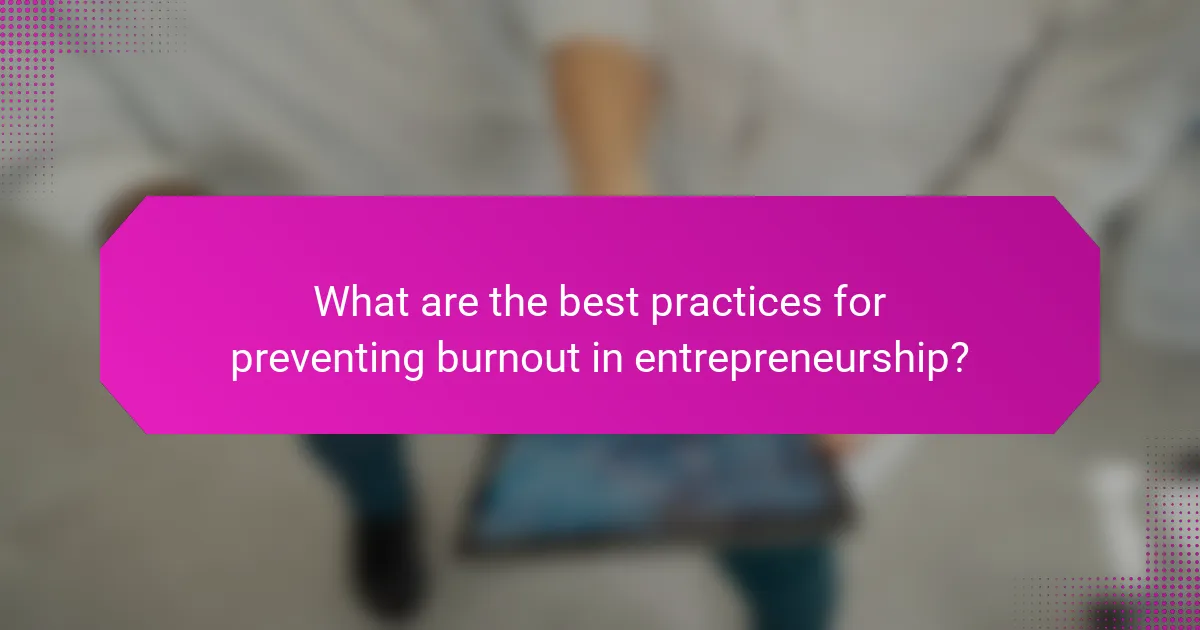
What are the best practices for preventing burnout in entrepreneurship?
To prevent burnout in entrepreneurship, prioritize self-care and establish boundaries. Schedule regular breaks, maintain a balanced workload, and seek support from peers or mentors. Implementing mindfulness practices can enhance resilience and reduce stress. Tracking mental health indicators allows for proactive adjustments.
How can setting boundaries improve mental health?
Setting boundaries significantly enhances mental health by reducing stress and preventing burnout. Entrepreneurs often face overwhelming demands, leading to isolation and exhaustion. Establishing clear limits helps manage workloads, fosters healthier relationships, and promotes self-care. Research indicates that individuals who set boundaries report lower anxiety levels and improved emotional well-being. By prioritizing mental health, entrepreneurs can sustain their passion and productivity over the long term.
What are the signs of impending burnout to watch for?
Signs of impending burnout include chronic fatigue, irritability, decreased productivity, and feelings of detachment. Entrepreneurs often experience these symptoms due to high stress and isolation. Recognizing these signs early can prevent further mental health decline. Addressing work-life balance and seeking support are crucial steps to mitigate burnout risks.
How can entrepreneurs cultivate a sustainable work environment?
Entrepreneurs can cultivate a sustainable work environment by prioritizing mental health initiatives and fostering community support. Implementing regular check-ins, promoting work-life balance, and encouraging open communication can significantly reduce stress, isolation, and burnout. Research indicates that 75% of entrepreneurs experience mental health challenges, highlighting the need for proactive measures. Creating a culture that values well-being not only enhances productivity but also attracts and retains talent.
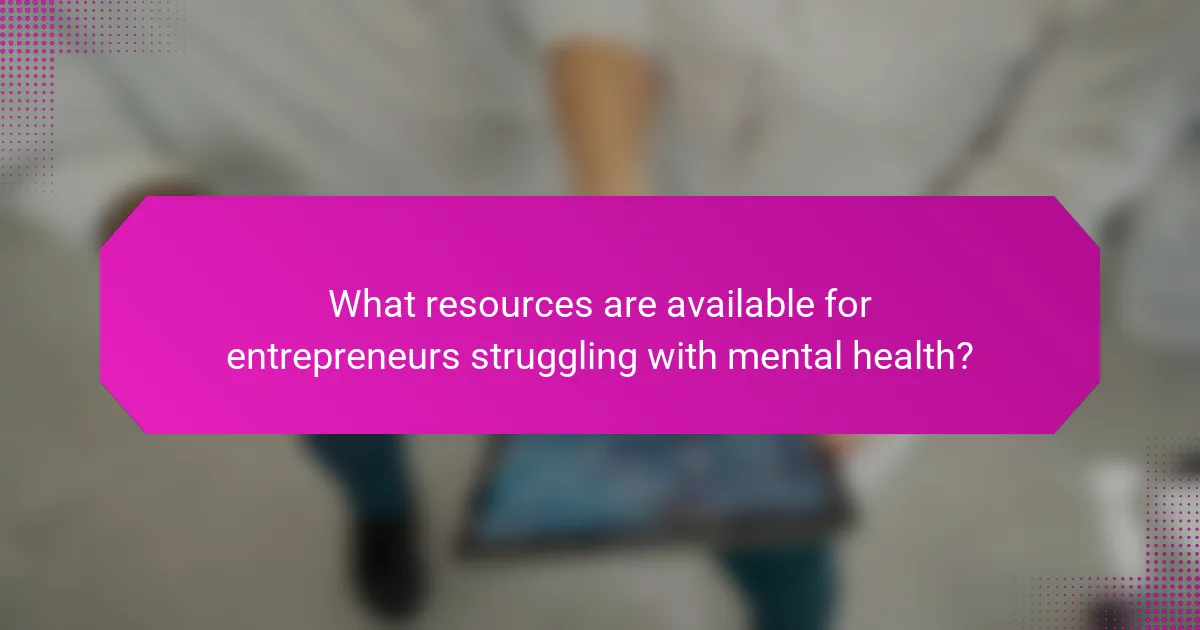
What resources are available for entrepreneurs struggling with mental health?
Entrepreneurs struggling with mental health can access various resources to support their well-being. Mental health organizations offer counseling and support groups tailored for entrepreneurs. Online platforms provide webinars and courses focused on stress management and resilience. Additionally, peer support networks foster connections among entrepreneurs facing similar challenges. These resources help mitigate stress, isolation, and burnout.
How can therapy or counseling support entrepreneurial mental health?
Therapy or counseling can significantly enhance entrepreneurial mental health by providing coping strategies and emotional support. Entrepreneurs often face stress, isolation, and burnout, which therapy can help mitigate. Regular sessions can improve self-awareness, allowing entrepreneurs to identify triggers and develop resilience.
Additionally, therapy fosters a safe space for discussing challenges, reducing feelings of isolation. Studies indicate that entrepreneurs who engage in therapy report higher levels of satisfaction and lower stress levels. As a result, therapy becomes a crucial tool for maintaining mental well-being in the demanding entrepreneurial landscape.
What role do mentorship and peer support play in mental well-being?
Mentorship and peer support are crucial for enhancing mental well-being among entrepreneurs. They provide emotional support, reduce feelings of isolation, and help manage stress. Studies show that entrepreneurs who engage in mentorship report lower levels of burnout and improved resilience. Peer networks foster a sense of community, offering shared experiences and practical advice that can alleviate the pressures of entrepreneurship.

How can entrepreneurs prioritize their mental health effectively?
Entrepreneurs can effectively prioritize their mental health by implementing structured routines, seeking social support, and practicing mindfulness. Establishing a daily schedule helps manage time and reduces stress. Connecting with peers combats isolation, while mindfulness techniques enhance emotional resilience. Regularly assessing mental health needs fosters proactive management of stress and burnout.
What actionable steps can entrepreneurs take to enhance their mental well-being?
Entrepreneurs can enhance their mental well-being by implementing structured routines, seeking social support, and practicing mindfulness. Establishing a daily schedule helps manage time and reduces stress. Building a network of peers provides emotional support and reduces feelings of isolation. Mindfulness practices, like meditation, improve focus and resilience against burnout. These steps directly address the unique challenges entrepreneurs face, such as stress and isolation.
What common mistakes should entrepreneurs avoid regarding mental health?
Entrepreneurs should avoid neglecting their mental health, overworking, isolating themselves, and ignoring signs of burnout. These common mistakes can lead to severe consequences.
Neglecting mental health can manifest in decreased productivity and creativity. Overworking often leads to chronic stress and exhaustion. Isolation prevents support from peers, making challenges feel overwhelming. Ignoring burnout signs can result in long-term health issues.
Recognizing these pitfalls is crucial for sustainable success. Prioritizing mental well-being enhances resilience and fosters a healthier work environment.
How can mindfulness and self-care practices support mental health?
Mindfulness and self-care practices significantly enhance mental health by reducing stress and preventing burnout. Regular mindfulness meditation can improve focus and emotional regulation, while self-care routines foster resilience against isolation. Studies show that these practices can lower anxiety levels by up to 30%. Implementing simple techniques like deep breathing or journaling can create a unique attribute of self-awareness, promoting overall well-being among entrepreneurs facing mental health challenges.
